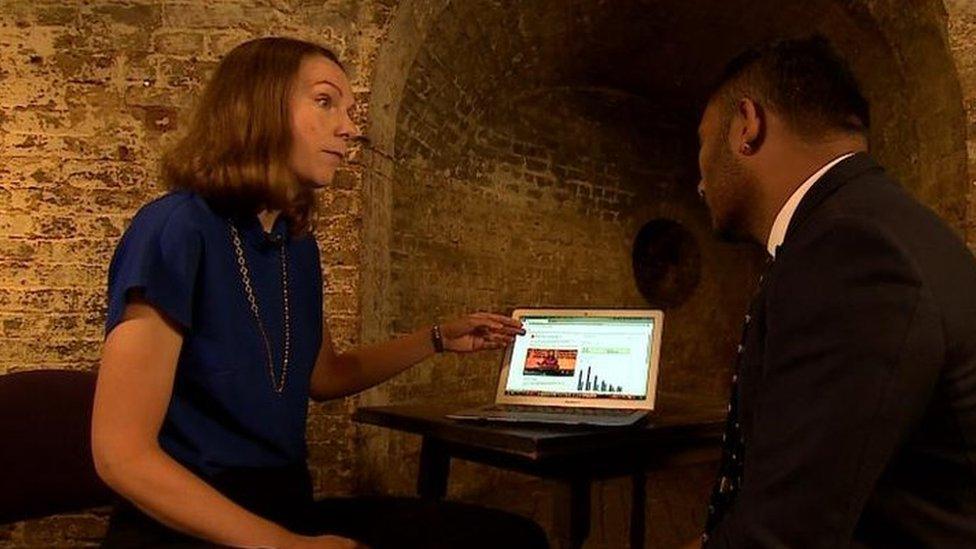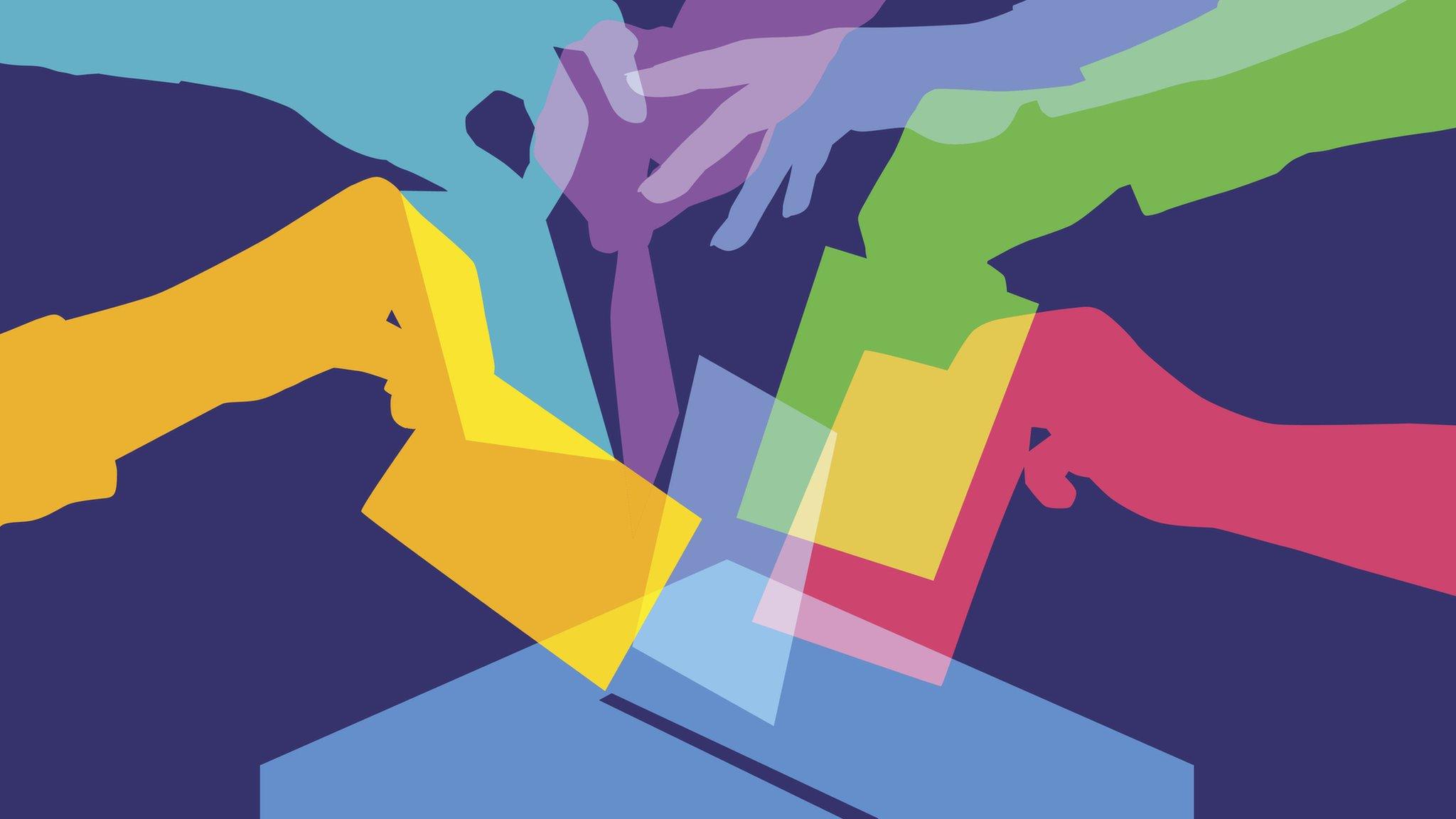UK shows how not to regulate tech
- Published
Nobody said it was easy. But it shouldn't be this hard either.
For the past three years, the clamour to better regulate the internet - that is, exercise democratic scrutiny over it - has grown exponentially. But in terms of new laws, the silence has been deafening.
As Dr Kate Dommett, director of the Crick Centre for the Public Understanding of Politics, in Sheffield, has written this week, external, two regulators (Electoral Commission and Information Commissioner's Office), eight parliamentary inquiries, and four reviews have looked into how better Britain might regulate the internet, in just the past few years.
And how much fresh regulation or legislation has come to pass? Virtually nothing. Nowt, nada, nought (or almost nought). Meanwhile, the power of a few mostly Californian tech giants has grown hugely. They, more than our Parliament, are controlling the integrity of British democracy in the digital sphere.
As a result, Britain is entering an election not just ill-equipped for the shift of campaigning to digital media, but in which the vast bulk of thinking, debating, and scrutinising that has been undertaken by academics, journalists and policymakers for the past three years has been largely ignored.
The mismatch between a fast-changing digital world and the response of British legislators is a test case in how technology always outpaces democracy, and the frustrating and harmful consequences of political deadlock.
No response
Dommett is special adviser to the House of Lords Select Committee on Democracy and Digital Technologies, and one of countless smart academics influencing policy discussion in this area.

Dr Kate Dommett has been analysing the government's response to 14 reports on digital issues
I have seen a copy of her internal report to the committee. It is a devastating indictment of UK policymaking in recent years. An edited (and kinder) summary is on her Twitter thread., external
Of the 14 reports that Dommett analysed, the government has only responded to half. Seven of them, with all the evidence gathered, time spent, and resources committed, haven't even had the courtesy of a considered response.
The government hasn't responded to the children's commissioner for England report, Growing Up Digital.
The government hasn't responded to the recommendation of the Hodgson Review on Third Party Election Campaigning that legislation be introduced so that "digital material must have an imprint saying who is behind the campaign and who created it".
The government hasn't responded to a recommendation of both the Electoral Commission and the Speaker's Commission on Digital Democracy: that the former should have greater powers to obtain information outside of an investigation.
There are countless other examples of recommendations made, on the basis of extensive examination of complex subjects, that have prompted no response from the government.
Churnalism, anyone?
An Online Harms White Paper released earlier this year contains the clearest distillation of the government's thinking on a wide range of subjects. At the launch event, at the British Library in July, there was big talk about Britain introducing the toughest laws in the world for the internet.
After a turf war within Whitehall, two cabinet ministers were wheeled out to show just how seriously the government was taking this. Then Home Secretary Sajid Javid, and then Culture Secretary Jeremy Wright, each said their piece.
The Online Harms White Paper was years in the making, and had been endlessly delayed. At the final stages, it became suddenly much more politicised, because there was a battle on to be Tory leader, and therefore prime minister. And Mr Javid was a prime contender.
Obviously the fact that we are in an election campaign means any current legislative process is on hold. But over the past three years, precious little legislation has come to pass, and one of the main reasons is the remarkable rate of churn at the government department responsible.
When I interviewed Mr Wright, then secretary of state at the Department for Digital, Culture, Media and Sport, last November, I asked him how long he would last in post, given the brief tenure of his recent predecessors. He said nothing of note, but it turned out he would last until July, when he was replaced by Nicky Morgan.
She's now leaving politics, so the DCMS will get its third cabinet minister in a year. Trying to recall DCMS cabinet ministers from the past few years reminds me of that pub quiz classic: how many of Mike Atherton's opening partners for the England cricket team can you mention? (There were 12; , externalWayne Larkins and Mark Lathwell are the tricky ones).
How many of the DCMS bosses can you remember? Since September 2012, when Jeremy Hunt was still in post, the following people have been in that role: Maria Miller, Sajid Javid, John Whittingdale, Karen Bradley, Matt Hancock, Jeremy Wright, Nicky Morgan. And another one is imminent, making it nine in just over seven years.
Pity the civil servants who are trying, despite all the bureaucratic vicissitudes of Whitehall, to keep pace with the billionaire radicals of Silicon Valley. What's the point, frankly, of them getting to know the philosophy of their cabinet minister, when another will be along in a moment or two?
A tough job made tougher
The dropping of the so-called "porn block", in which users would be required to verify their age when using pornography online, resulted from legal, technical and privacy concerns. This came despite repeated assurances from ministers that such concerns had been dealt with.
The big regulatory adjustment that we have all had to make came from GDPR, which the information commissioner oversees in this country. That regulation comes from Europe, and - so far - is generally thought in Whitehall to have successfully empowered citizens. It is being closely watched by Washington.
It would be remiss to overlook the fact that for many legislators, social media is a very complex and sophisticated world which they do not fully understand, and where they are constantly playing catch-up.

The Information Commissioner, Elizabeth Denham, is closely watching how political parties use personal data
And as this page has noted several times before, regulating the internet is exceptionally difficult. Unlike with most public utilities (and there's an argument to be had about whether digital communication is a utility), the nature of the internet changes every day.
Suddenly, new platforms, possibilities and threats emerge. There's been a lot of talk (not least from the BBC) about the importance of Facebook. Many journalists (including me) spend too much time on Twitter, which gets outsize attention as a result. But what do we really know about how TikTok, for instance, is being used by campaigners? Its owner, Bytedance, has a billion users and close connections to the Chinese government. How do you regulate that?
Then there is the fact that the companies in question are often not based in the UK. That creates practical and legal challenges. So too does the need to get agreement across territories and parliaments, in a way that just doesn't apply to, say, water.
Nevertheless, while there are huge concerns about how digital media can be exploited by campaigners - including foreign and malign ones - you should probably know that, for all the noise and controversy of recent years, Britain goes into this election with digital defences that are not just weak, but mostly crafted in California.
Is that what voters want, or deserve?
If you're interested in issues such as these, you can follow me on Twitter, external or Facebook, external; and subscribe to The Media Show podcast from BBC Radio 4.
- Published8 November 2019

- Published31 October 2019

